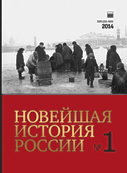«Сползающая маска нейтральности». Советско-шведские отношения в конце 1940-х – начале 1950-х гг.
”The Mask of Neutrality Slips Away”. Soviet-Swedish Relations in the late 1940s – early 1950s
Author(s): Aleksandr Ivanovich RupasovSubject(s): History
Published by: Издательство Исторического факультета СПбГУ
Keywords: Sweden; Soviet Union; Baltic; international relations; T. Erlander; O. Unden; conflicts; Molotov; Malenkov; R. Sohlman; NATO; CoCom
Summary/Abstract: The article considers the complex of objective reasons behind the deterioration of Soviet-Swedish relations in the late 1940s – early 1950s. A brief “thaw” in Soviet-Swedish relations in 1945–1946, due largely to the Swedish government’s policy of “building bridges,” was followed by a long period of increasing tensions. The basic contradictions were generated by the position of the Swedish delegation to the UN on a number of international issues (for example, the call for members of the Security Council not to exercise their veto power when considering the peaceful resolution of disputes); the attitude of the Swedish government toward negotiations on the establishment of NATO, the “Marshall Plan” and the “Schuman Plan,” the Stockholm initiative on the creation of a neutral Scandinavian Defense Union, and the Swedish side’s rejection of expanded Soviet water boundaries in the Baltic sea; and the attitude of Tage Erlander’s cabinet to the system of export controls on dual-use goods (CoCom) and its support of the Estonian and Latvian diaspora in Sweden. The main thesis of this treatment of Soviet analytical materials from the late 1940s – early 1950s is the assertion that the Swedish government was hostile to Soviet policy, despite claims of neutrality (“the formal mask of ’neutrality’ slips off the face of the Swedish rulers”). But if those in Moscow were aware that the changes affecting Sweden's foreign policy, they were powerless to change Swedish diplomacy and instead focused on identifying the new issues and adapting to them.
Journal: Новейшая история России
- Issue Year: 4/2014
- Issue No: 09
- Page Range: 157-180
- Page Count: 24
- Language: Russian

